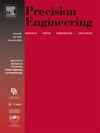提高AISI 304的硬分离性能:传统的洪水冷却与环保植物油基可持续MQL的比较研究
IF 3.7
2区 工程技术
Q2 ENGINEERING, MANUFACTURING
Precision Engineering-Journal of the International Societies for Precision Engineering and Nanotechnology
Pub Date : 2025-08-14
DOI:10.1016/j.precisioneng.2025.08.005
引用次数: 0
摘要
机加工操作对于航空航天、生物医学和其他先进行业的精密部件的生产是必不可少的。本研究通过关注AISI 304不锈钢的分切操作来解决这一显著的研究空白,与广泛研究的车削操作相比,这一过程在很大程度上被忽视了。在干切削、常规(矿物油)和最少量润滑(MQL,植物油基)条件下,对这种难切削材料的可加工性进行了评估。在模拟实际加工条件的室温和高温条件下,对切削液的动态粘度和热导率进行了全面分析,提供了全面的热流变特性。实验在不同进给量(0.01 ~ 0.03 mm/rev)和切削速度(20和30 m/min)下进行。与干切削相比,MQL和传统冷却显著改善了性能指标:表面粗糙度分别降低了64%和88%,达到0.829 μm和0.279 μm;切削温度分别降低了54%和62%;MQL和常规方法分别减少了71%和74%的侧翼磨损。实时温度监测和图形记录证明了MQL系统的环保性和经济性,即使在具有挑战性的分离作业中也是如此。在进给速度为0.01 mm/rev、切削速度为30 m/min的MQL条件下,切削区温度和刀具磨损显著降低,加工零件表面质量显著提高,实现了可持续性加工。这清楚地表明,即使在苛刻的几何条件下,植物油基MQL也是传统冷却方法的一种优越、环保、经济的替代方案。本文章由计算机程序翻译,如有差异,请以英文原文为准。

Enhancing hard parting off performance on AISI 304: A comparative study of conventional flood cooling and eco-friendly vegetable oil-based sustainable MQL
Machining operations are essential for producing precision components in aerospace, biomedical, and other advanced industries. This study addresses the notable research gap by focusing on the parting off operation of AISI 304 stainless steel, a process that has been largely overlooked compared to the widely studied turning operation. The machinability of this difficult-to-cut material was evaluated under dry cutting, conventional (mineral oil), and minimum quantity lubrication (MQL, vegetable oil-based) conditions. The dynamic viscosity and thermal conductivity of the cutting fluids were thoroughly analyzed both at room temperature and elevated temperatures simulating actual machining conditions, providing a comprehensive thermo-rheological characterization. Experiments were conducted at various feed rates (0.01–0.03 mm/rev) and cutting speeds (20 and 30 m/min). MQL and conventional cooling significantly improved performance metrics compared to dry cutting: surface roughness decreased by 64 % and 88 %, reaching 0.829 μm and 0.279 μm, respectively; cutting temperatures were reduced by 54 % and 62 %; and flank wear diminished by 71 % and 74 % under MQL and conventional methods, respectively. Real-time temperature monitoring and graphical recording demonstrated the effectiveness of the environmentally friendly and economical MQL system even in the challenging geometry of the parting off operation. The optimal results were obtained at a feed rate of 0.01 mm/rev and cutting speed of 30 m/min using MQL, where the cutting zone temperature and tool wear were significantly reduced, and the surface quality of the machined part was markedly improved, leading to a sustainable manufacturing process. This clearly establishes that vegetable oil-based MQL is a superior, eco-friendly, and cost-effective alternative to conventional cooling methods, even under demanding geometric conditions.
求助全文
通过发布文献求助,成功后即可免费获取论文全文。
去求助
来源期刊
CiteScore
7.40
自引率
5.60%
发文量
177
审稿时长
46 days
期刊介绍:
Precision Engineering - Journal of the International Societies for Precision Engineering and Nanotechnology is devoted to the multidisciplinary study and practice of high accuracy engineering, metrology, and manufacturing. The journal takes an integrated approach to all subjects related to research, design, manufacture, performance validation, and application of high precision machines, instruments, and components, including fundamental and applied research and development in manufacturing processes, fabrication technology, and advanced measurement science. The scope includes precision-engineered systems and supporting metrology over the full range of length scales, from atom-based nanotechnology and advanced lithographic technology to large-scale systems, including optical and radio telescopes and macrometrology.

 求助内容:
求助内容: 应助结果提醒方式:
应助结果提醒方式:


